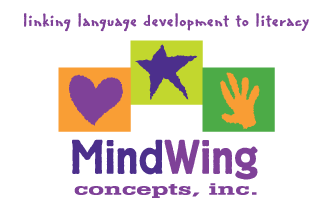Secure Checkout + FREE SHIPPING (U.S. Orders over $60)
Menu
-
- Home
-
About Us
-
The Approach
-
Linking Language & Literacy
-
Professional Learning
-
Learning Resources
-
SHOP
-
Blog
-
- About MindWing
- Our People
- Contact Us
- Your Account
- Login
-
United States (USD $)

Secure Checkout + FREE SHIPPING (U.S. Orders over $60)
Tech Tuesday: Snow Stories
by Sean Sweeney February 21, 2017 3 min read
 Just about any topic can be a context to develop narrative and expository language with Story Grammar Marker®, Braidy the StoryBraid®, and Thememaker®’s narrative and informational language icons and maps.
Just about any topic can be a context to develop narrative and expository language with Story Grammar Marker®, Braidy the StoryBraid®, and Thememaker®’s narrative and informational language icons and maps.
Right about now, snow is big on everyone’s mind in the Northeast, having just endured a blizzard and with another snowy week on the way. So, though I don’t love it, snow can provide a good example of working within a theme and identifying and pairing activities to build narrative and other language skills while immersing students in a context.
When first thinking about the topic of snow—or any topic really—naturally, we consider books. Recall in an earlier blog about Epic! Books for Kids (free with educator account via web or with apps for iOS, Android, and Apple TV) how the app is a wonderful resource of electronic books on a huge variety of topics.

Searching this app for “snow,” I quickly found a narrative example in Sally’s Snow Adventure, by Stephen Huneck. This series about Sally the dog describes immersive settings for narrative mapping, but each story also can be analyzed as Action Sequences or at more complex narrative levels. For example, considered as an Action Sequence, the book could be retold as follows:
|
|
However, this story could also be retold at more complex levels, such as the Abbreviated Episode:
|
|
The events Sally experiences and the map-like illustration in the book (again, see above) got me thinking about maps and their usefulness in scaffolding descriptions of Settings, and I wondered if there were any good maps of ski resorts.
Even better, it turns out that Google Maps provides a navigable “Street View” of a number of mountains. This page tells you which resorts have “Mountain Maps.” To “ski” down one of them with your students, follow these steps:
- Install and open the free Google Maps app.
- Search for any of the mountain maps listed in the link above.
- Scroll with your finger to locate a ski lift (red lines) or green, blue, or black trail.
- Tap and hold on any point of a trail to create a “Dropped Pin.”
- Tap the “view” image on the lower left to enter Street View and navigate the trail via the arrows.

 An activity such as this provides an engaging observational context for students to generate descriptive details about the Setting. At the same time, a Setting Map could be used to focus on details such as location, shape/size, parts/areas, function, and comparison to another setting- or to describe with the five senses as prompted by the five points of the Setting icon.
An activity such as this provides an engaging observational context for students to generate descriptive details about the Setting. At the same time, a Setting Map could be used to focus on details such as location, shape/size, parts/areas, function, and comparison to another setting- or to describe with the five senses as prompted by the five points of the Setting icon.
 Finally, extending the context of the book into yet another activity, students can be asked to create their own “mountain” with trails, a great way to work on spatial language and even the emotional vocabulary associated with green, blue or black trails (show a YouTube video such as the above skiers-eye-view if you need to give your students an e-motional experience and more schema on skiing).
Finally, extending the context of the book into yet another activity, students can be asked to create their own “mountain” with trails, a great way to work on spatial language and even the emotional vocabulary associated with green, blue or black trails (show a YouTube video such as the above skiers-eye-view if you need to give your students an e-motional experience and more schema on skiing).
This can be done on paper but also as a quick activity with Doodle Buddy (free):
Enjoy what is hopefully the end of the winter!
Sean Sweeney
Sean Sweeney, MS, MEd, CCC-SLP, is a speech-language pathologist and technology specialist working in private practice at the Ely Center in Needham, MA, and as a clinical supervisor at Boston University. He consults with local and national organizations on technology integration in speech and language interventions. His blog, SpeechTechie (www.speechtechie.com), looks at technology “through a language lens.” Contact him at sean@speechtechie.com.
Leave a comment.
Comments will be approved before showing up.
